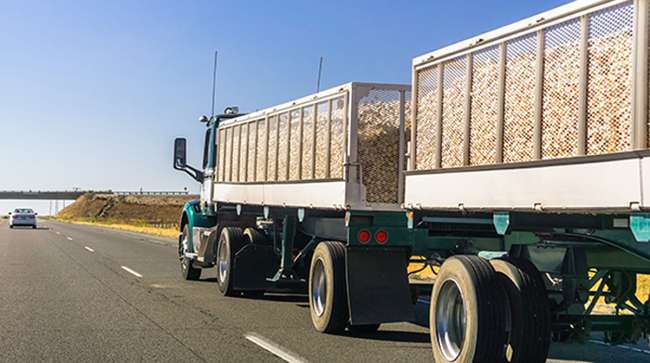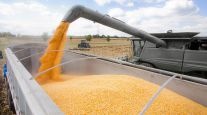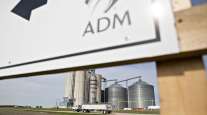Senior Reporter
Trucks Key to Movement of Agricultural Products, USDA Report Finds

[Stay on top of transportation news: Get TTNews in your inbox.]
The trucking industry is central to the country’s agriculture sector as trucks transport a significant majority of agricultural freight by tonnage, according to a report published in December by the U.S. Department of Agriculture.
Specifically, trucks are responsible for 83% of the agricultural freight movements by tonnage and accounted for 56% of agricultural freight ton-miles, according to “The Importance of Highways to U.S. Agriculture.” The findings relied on information collection from researchers at the U.S. Department of Transportation.
“Trucks carry the majority of agricultural freight across all commodity groups,” the report stated. “Truck mode share is especially high for meat, poultry, fish and seafood (greater than 95%). Even grains, which frequently move long distances by rail and barge, have greater than 70% of tonnage moved by truck.”
USDA Highways by Transport Topics
The findings also emphasized trucks’ prevalence across short distances. Per the report, “Trucking provides a critical link between farmers, ranchers, manufacturers, feedlots, and rail, barge and port terminals.”
In 2018, 4.5 billion tons of agricultural products, worth $3.1 trillion, moved via all transportation modes.
Researchers also pointed to the effect inadequate and substandard infrastructure conditions could have on agricultural freight movement. To avoid impediments caused by poor infrastructure, greater funding investments should be dedicated, the report said. Specifically, the researchers determined that truck operating cost-savings of about $540 million annually could be achievable with state-planned highway freight investments. Retraining also could eventually offer certain aspects of the transportation workforce newfound opportunities.
“Targeted investments in highway infrastructure can help address condition challenges,” according to the report, which noted sound access to commercial corridors would improve the transport of commodities. “The impacts of infrastructure improvements on the agriculture sector are vast, encompassing agricultural productivity, transportation costs, food prices and international competitiveness,” it continued.

Ibach
USDA Undersecretary for Marketing and Regulatory Programs Greg Ibach on Dec. 17 said: “Agricultural freight movement is essential for moving goods from the farm to the consumer’s table. Efficient transportation helps keep food prices low for consumers and enables the U.S. agricultural industry to compete in a global marketplace.”
In 2018 the department published a report highlighting barge transportation in relation to moving agricultural products, such as grains and oilseeds. Added Ibach, “Together the two reports can be used to identify important infrastructure investments, drive updates to state freight plans and long-range transportation plans, inform policy discussions, and help identify priorities for future research.”
Jon Samson, executive director of American Trucking Associations’ Agricultural and Food Transporters Conference, applauded the report’s findings, noting the pressing need to further invest in infrastructure improvements.
“As mentioned in the report, truck transportation is responsible for the majority of commodity movements throughout all modes, with nearly every single movement touching at least one truck,” Samson told Transport Topics on Dec. 18. “The report also appropriately points out the condition of the current infrastructure system and the significance of completing projects to ensure safe and efficient movement of the commodities. This very informative and valuable report not only provides us great insight into the importance of transportation to the current commodity supply chain, but also the significance in ensuring future investment in our highways is accomplished during the next infrastructure bill.”

Home | Video | Heroes' Photo Gallery
Saluting the men and women of the trucking industry who kept America's essential goods flowing during the coronavirus pandemic.
Heroes: Peter Lacoste | Susan Dawson | James Rogers | Reggie Barrows | Kevin Cooper | Cesar Quintana Moreno
Congress, which commences a new session in January, is expected to approve investments for big-ticket infrastructure projects. House and Senate policymakers signaled the potential for advancing climate change-centric measures that would target supply chains. Transportation policy observers suggest COVID-19 is likely to be less disruptive in 2021. Even if a vaccine allows the freight industry to stabilize, an expectation is for workforce adaptations in commerce to improve delivery services in the coming years.
Staff Reporter Eleanor Lamb contributed to this article.
Want more news? Listen to today's daily briefing:
Subscribe: Apple Podcasts | Spotify | Amazon Alexa | Google Assistant | More




